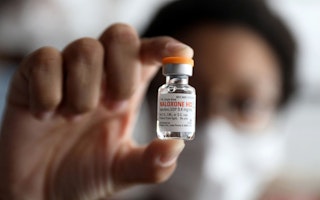When Patent Law Stands in the Way of Saving Lives
By Brett Davidson & Els Torreele
A New York Times column from early July provided an unusual if cynical insight into the “a la carte” corporate lobby influence on American legislation. While the United States is among the world’s strongest proponents of ever-increasing intellectual property protections and their worldwide enforcement, Wall Street banks have been able to carve out an exception that would allow them to copy business methods and processes, including financial products and services they deem important for their highly profitable businesses, such as automated methods for making digital copies of checks, or specialized financial and trading software. Proponents of the provision, which is buried in a bill aimed at strengthening the U.S. patent system that is currently before Congress, say banks should not be held hostage by companies that hold "business method" patents, and argue that such patents should never have been granted in the first place.
How interesting that an exception in the otherwise “sacrosanct right” to protect patents can be made to safeguard business interests for the big banks (the same banks that have been blamed for endangering the global economy through their reckless speculation), while no such concession is even thinkable when it comes to safeguarding access to lifesaving medicines for millions of patients around the world.
On the contrary—despite the best advocacy efforts of the Access to Medicines movement over the past 15 years—we have witnessed a progressive strengthening of pharmaceutical patents, in duration, scope and geographical applicability. As a result, patent monopolies leading to high medicines prices preclude treatment for an increasing number of patients living in developing countries (80 percent of the world population).
For instance, a full treatment course for hepatitis C—a disease affecting 180 million people worldwide—costs up to $50,000 thanks to patent-protected monopoly pricing, and remains virtually inaccessible for the majority of people living outside of the U.S. and Europe (where health insurance covers the high price of treatments).
Moreover, both nationally and in the international arena, the U.S. government is striving to secure evermore rigid and wide-ranging patent protections on medicines that leave less and less flexibilities to safeguard access. For example, according to a document leaked recently from free trade negotiations between the United States and countries on the Pacific rim, the U.S. is pushing for patent provisions that delay the entry of generic drugs into the market, and US negotiators propose eliminating the ability to challenge pharmaceutical patents before they are granted.
Yet such pre-grant opposition has been used to great effect by treatment activists in India and Brazil, where civil society groups have challenged “frivolous” patents on essential drugs such as HIV/AIDS and cancer medicines.
Pre-grant opposition is a crucial element of any reasonable patent regime, an important mechanism to balance the public interest when providing monopoly rights and to help prevent abuse. For example, as part of their “product life-cycle management,” pharmaceutical companies routinely seek to extend patents far beyond the initial 20-year term through so-called "evergreening": applying for follow-on patents based on trivial changes of an existing medicine such as using a different crystal form of the same drug, or converting a tablet to syrup or modifying the dose. Applying a strict interpretation of patent law, such trivial changes do not comply with the three key criteria for the granting of a patent: novelty, inventiveness and industrial applicability—where inventiveness is understood to mean an innovation that is nontrivial to someone "skilled in the art."
In reality, many national patent offices do not have the capacity to examine patent applications closely, and tend to grant such frivolous patents unless someone opposes it. Patent challenges have proven an important tool against abusive patenting of medicines, and are critical in safeguarding access to affordable generic medicines. The U.S. government, however, is all too eager to see this option removed from national patent law of its trade partners.
So what is the difference?
In the case of medicines the pharmaceutical industry, well-known for its powerful lobby in DC, is holding the patents in question, and uses all its power to protect and enforce them through US and international legislation. In the case of banking products and services, the powerful Wall Street banks are the ones whose interests need to be served, and in that case it seems that US legislators seem only too willing to compromise on patent rights, despite touting constantly how protecting intellectual property rights is one of the fundamental pillars of “fair” trade. (One recent example: Hillary Clinton speaking in Hong Kong this week.)
While legislators in the U.S. are pushing a Wall Street exemption to patent law, threatening the income of many smaller businesses in order to protect large banks against “frivolous patents,” millions of people around the world are being denied access to lifesaving medication because the US is pushing to protect just such frivolous patents.
At first glance this may seem like hypocrisy, but it’s actually perfectly consistent. In each case, the beneficiaries are the rich and powerful. When it comes to medicines, the losers are millions of ordinary citizens who cannot afford the lifesaving medicines they need.

Until November 2021, Brett Davidson was director of the Media and Narratives Division of the Open Society Public Health Program.
Until January 2017, Els Torreele was director for the access and accountability activities of the Open Society Public Health Program.

